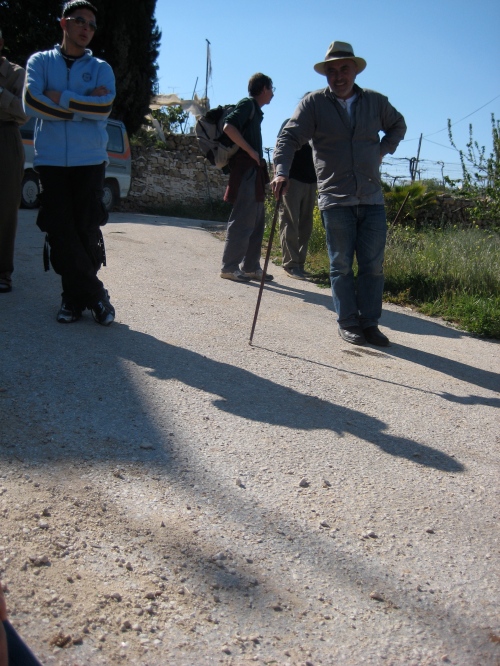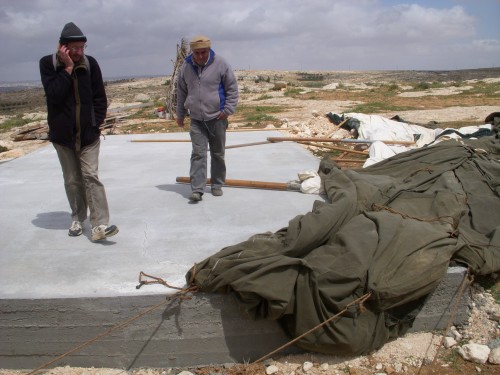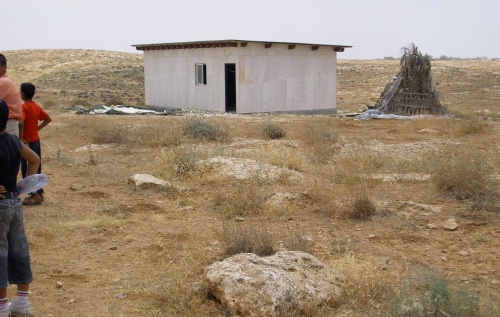
Ezra Nawi… If we had 20 Ezra Nawis, the Occupation would be already finished. Ezra is one of the righteous men, that thanks to them, we are not yet [destroyed like] Sodom and Gomorrah. (Yehuda Agus, Taayush Activist)
If there was one face that represents the efforts of Israeli activists for coexistence and human rights, it would be Ezra Nawi. A plumber by trade, Ezra is a Jew of Iraqi origin who has been involved in progressive causes and politics since childhood. Around 1999, Ezra began dedicating his energies and passions to human rights in the Palestinian Territories.
I have found Ezra to be a warm and generous person. He is welcoming to the newcomer and is ready to give them his attention and respect. Even in the most difficult situations, Ezra uses humor and grace to put others at ease. A recent documentary, “Citizen Nawi”, captures the passion and dedication of the man.
Recently, Ezra has been convicted of assaulting a soldier, a charge rejected by those who know him. He is currently awaiting sentencing in July.
I have invited a few experienced activists to share their experiences with Ezra and the importance of his role among Israeli human rights activists. At the end are a few thoughts that Ezra himself shared with me.
David Shulman (Renee Lang Professor of Humanistic Studies, Hebrew University of Jerusalem; author of Dark Hope: Working for Peace in Israel and Palestine.)
Ezra Nawi is probably the most courageous person I have ever met. I have seen him in countless moments when settlers violently attacked him and other peace activists, Palestinians and Israelis; his presence of mind, steadfastness, and clarity always got us through such times. He is that most unusual of human beings– a person of profound inner gentleness and moral principle, selfless and creative in finding ways to help the Palestinian shepherds and farmers of the South Hebron hills. It is largely to Ezra’s unremitting efforts that these people are still living on their lands in the face of constant efforts by the Israeli state, the army, police, and rampaging settlers, to dispossess them. Ezra is utterly committed to non-violent protest in the Gandhian mode; he is an inspired force for goodness and a reason not to lose hope in human potential to do the decent thing. But I don’t want to give the impression that he is some kind of saint: he is an earthy, full-blooded man, certainly capable of anger and capable of verbally expressing his contempt for the (indeed contemptible) soldiers, settlers, and policemen who have turned the lives of the south Hebron Palestinians into a living hell. Although I have an instinctive dislike of “heroes,” and abhor hero-worship wherever I meet it, I have to say that in my eyes, and in my experience, Ezra Nawi is heroic in the finest sense of the word– the sense of an ordinary human being who puts himself at risk, even great risk, in order to do what is right in the service of those who are suffering, oppressed, and in need.
Anat Rosenwaks (Taayush Activist since 2001)
Ezra Nawi. For several weeks I have been trying to decide what to write. Where do I start? There’s so much to say about Ezra, but it’s difficult to convey who he is to those who have never met him. Why have such a diverse group of people been willing to make such an effort to prevent his imprisonment?
I remember when Ezra joined Ta’ayush. Everyone was talking about the Jerusalemite plumber – not the usual activist. Unique in his appearance, (always wearing an interesting hat) Ezra is charming, charismatic and fully devoted to human rights and political activism.
Recently, on the eve of the holiday Shavuot, there was no “official” activity in the South Hebron area, or in any other place in the West Bank. Most people in Israel were resting or getting ready for the holiday. But Ezra, like always, was in Tuba, a small village in the South Hebron Hills next to the illegal outpost of Ma’on. A few days earlier, a young woman from the village was taken to the emergency room in Jerusalem. Ezra, who has supported her family for years, picked her and her father up from the checkpoint and hosted the father for 2 days in his apartment. Ezra then drove them back to their house when she was released.
For many of the families in the South Hebron area, Ezra is the first one to call when they are in trouble. He’s always available, willing to help at almost anytime of day. He speaks fluent Arabic and never hesitates before getting into his car to drive to the place he’s needed, or make phone calls to “half of the world” just to help someone who is stuck at a checkpoint.
Ta’ayush activity has changed tremendously since Ezra joined us and his influence in the improvements in the situation in the South Hebron area is enormous. Without him, for example, there would be no international activists staying permanently in one of the villages. Without Ezra, the school children of Tuba might still be using a very roundabout way to school, in order to avoid passing next to the violent settlers. Without Ezra the farmers of Gawawis, a small village that was occupied by settlers, may not have been able to return to their lands. Without Ezra, the people of Tuwane, who without Ezra, might still be attacked by settlers from the Ma’on outpost every Friday night, and have no access to a great part of their lands.
Ezra is welcome in any Palestinian town or village, and as a result, unwelcome by the police and army. They have tried to stop his activity in many ways, by arresting him so many times, searching his car and apartment. They try to frighten him by saying that the settlers are angry and want to harm him. And now, he has been convicted on false charges. It was his word against the word of two policeman.
I hope Ezra will not go to jail. But even if he does, this will not stop his activity or break him. He is a strong man, and has the support of all his friends in Israel, Palestine and all over the world.
Amiel Vardi (Professor of Classics, Hebrew University of Jerusalem)
One of the main reasons Ezra is such an important person is his personality. I mean, he is really easy prey for them [his detractors], being of Iraqi origin and being a plumber. Most of us activists come from well-established jobs. He is more vulnerable because of this, and, of course his declared homosexuality makes him especially vulnerable, and it’s used against him. It’s used by the settlers and it’s used by the police against him all the time.
So this is one thing that makes Ezra a special case. Another thing is, that Ezra is the only one of us that really has good relations day-to-day with the Palestinians. It’s not only a question of knowing the language, which is, of course, in his case superb; it’s knowing the habits, understanding what is behind the words, learning them really deeply and getting their approval. They trust him, like they trust none of us. And as such, he is the best activist I can think of.
We get into quarrels very often about the way things should be done. Sometimes perhaps, we are right and he is wrong, but very often his intuition is so much better than ours, simply because he understands the Palestinians so much better – I couldn’t think of any activity in all the region from Jerusalem south without the help of Ezra. This is true not only for Taayush, but for all the organizations, The Physicians for Human Rights, The Rabbis for Human Rights, Yesh Din, all depend on Ezra. And this is why for us Ezra is the most important issue at the moment.
Ezra in his own words
“If you can see what is going on there (in the Palestinian Territories), you have to get involved.” Ezra believes that if people ‘realized the price and the pain’ that comes from Israel’s actions in the territories, they would want to change the status quo. He says that A large problem of the occupation comes from its less visible elements. For example, “The dehumanization of Arabs and increase in Israeli nationalism.”
Ezra exclaims “Jews have been leaders in liberation and rights movements all over the world, in Russia, Iraq, apartheid South Africa and in the United States. How come here (in Israel) this hardly exists?”
Despite the setbacks and overwhelming odds, Ezra says, “There is no reason to be depressed or ashamed about the situation. Only the people who do nothing should feel that way.” His advice, is “think pink”.
To Help Ezra, please visit: http://supportezra.net/

Read Full Post »







